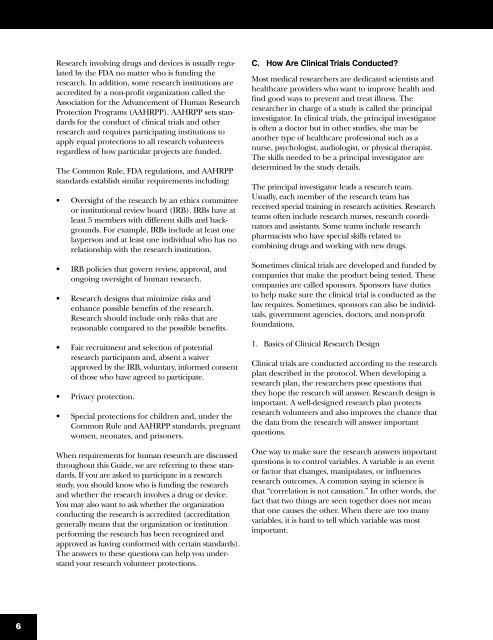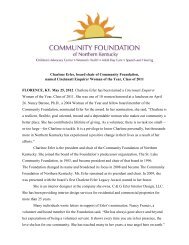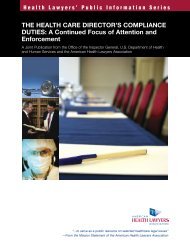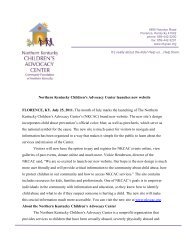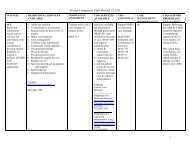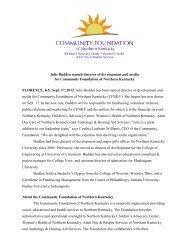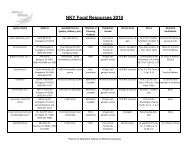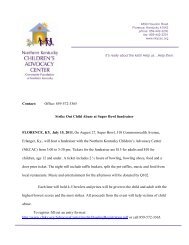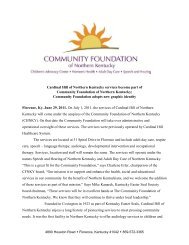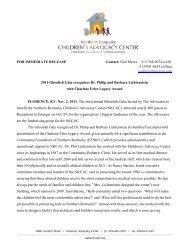Medical Research: A Consumer's Guide for Participation
Medical Research: A Consumer's Guide for Participation
Medical Research: A Consumer's Guide for Participation
You also want an ePaper? Increase the reach of your titles
YUMPU automatically turns print PDFs into web optimized ePapers that Google loves.
<strong>Research</strong> involving drugs and devices is usually regulated<br />
by the FDA no matter who is funding the<br />
research. In addition, some research institutions are<br />
accredited by a non-profit organization called the<br />
Association <strong>for</strong> the Advancement of Human <strong>Research</strong><br />
Protection Programs (AAHRPP). AAHRPP sets standards<br />
<strong>for</strong> the conduct of clinical trials and other<br />
research and requires participating institutions to<br />
apply equal protections to all research volunteers<br />
regardless of how particular projects are funded.<br />
The Common Rule, FDA regulations, and AAHRPP<br />
standards establish similar requirements including:<br />
• Oversight of the research by an ethics committee<br />
or institutional review board (IRB). IRBs have at<br />
least 5 members with different skills and backgrounds.<br />
For example, IRBs include at least one<br />
layperson and at least one individual who has no<br />
relationship with the research institution.<br />
• IRB policies that govern review, approval, and<br />
ongoing oversight of human research.<br />
• <strong>Research</strong> designs that minimize risks and<br />
enhance possible benefits of the research.<br />
<strong>Research</strong> should include only risks that are<br />
reasonable compared to the possible benefits.<br />
• Fair recruitment and selection of potential<br />
research participants and, absent a waiver<br />
approved by the IRB, voluntary, in<strong>for</strong>med consent<br />
of those who have agreed to participate.<br />
• Privacy protection.<br />
• Special protections <strong>for</strong> children and, under the<br />
Common Rule and AAHRPP standards, pregnant<br />
women, neonates, and prisoners.<br />
When requirements <strong>for</strong> human research are discussed<br />
throughout this <strong>Guide</strong>, we are referring to these standards.<br />
If you are asked to participate in a research<br />
study, you should know who is funding the research<br />
and whether the research involves a drug or device.<br />
You may also want to ask whether the organization<br />
conducting the research is accredited (accreditation<br />
generally means that the organization or institution<br />
per<strong>for</strong>ming the research has been recognized and<br />
approved as having con<strong>for</strong>med with certain standards).<br />
The answers to these questions can help you understand<br />
your research volunteer protections.<br />
C. How Are Clinical Trials Conducted?<br />
Most medical researchers are dedicated scientists and<br />
healthcare providers who want to improve health and<br />
find good ways to prevent and treat illness. The<br />
researcher in charge of a study is called the principal<br />
investigator. In clinical trials, the principal investigator<br />
is often a doctor but in other studies, she may be<br />
another type of healthcare professional such as a<br />
nurse, psychologist, audiologist, or physical therapist.<br />
The skills needed to be a principal investigator are<br />
determined by the study details.<br />
The principal investigator leads a research team.<br />
Usually, each member of the research team has<br />
received special training in research activities. <strong>Research</strong><br />
teams often include research nurses, research coordinators<br />
and assistants. Some teams include research<br />
pharmacists who have special skills related to<br />
combining drugs and working with new drugs.<br />
Sometimes clinical trials are developed and funded by<br />
companies that make the product being tested. These<br />
companies are called sponsors. Sponsors have duties<br />
to help make sure the clinical trial is conducted as the<br />
law requires. Sometimes, sponsors can also be individuals,<br />
government agencies, doctors, and non-profit<br />
foundations.<br />
1. Basics of Clinical <strong>Research</strong> Design<br />
Clinical trials are conducted according to the research<br />
plan described in the protocol. When developing a<br />
research plan, the researchers pose questions that<br />
they hope the research will answer. <strong>Research</strong> design is<br />
important. A well-designed research plan protects<br />
research volunteers and also improves the chance that<br />
the data from the research will answer important<br />
questions.<br />
One way to make sure the research answers important<br />
questions is to control variables. A variable is an event<br />
or factor that changes, manipulates, or influences<br />
research outcomes. A common saying in science is<br />
that “correlation is not causation.” In other words, the<br />
fact that two things are seen together does not mean<br />
that one causes the other. When there are too many<br />
variables, it is hard to tell which variable was most<br />
important.<br />
6


